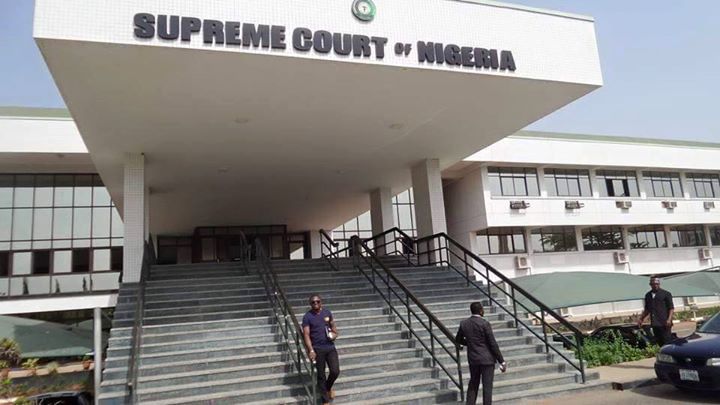The supreme court has reserved judgment in the suit filed by President Muhammadu Buhari and the attorney-general of the federation (AGF) seeking to void section 84(12) of the Electoral Act 2022.
Recall that President Buhari had on February 25 assented to the electoral act amendment bill.
He, however, asked the national assembly to delete section 84(12) of the act, which reads: “No political appointee at any level shall be a voting delegate or be voted for at the convention or congress of any political party for the purpose of the nomination of candidates for any election.”
Following the refusal, Buhari and the AGF on April 29, 2022, filed a suit marked SC/CV/504/2022 against the national assembly at the supreme court.
The plaintiffs are contending that section 84(12) of the Electoral (Amendment) Act, 2022 is inconsistent with the provisions of sections 42, 65, 66, 106, 107, 131, 137, 147, 151, 177, 182, 192 and 196 of the constitution as well Article 2 of the African Charter on Human and Peoples Rights.
On May 19, the Rivers state house of assembly and Rivers state attorney-general were joined as second and third defendants respectively.
At the court session on Thursday, Olukayode Ajulo, counsel to the national assembly, prayed the court to strike out the suit, accusing both President Buhari and Malami of abusing the judicial process.
Emmanuel Ukala, counsel to Rivers state, also agreed with the national assembly.
The respondents argued that having assented to the Electoral Act, the president cannot turn around to challenge it.
More so, they contended that only the political appointees whose rights may be infringed upon by the said provision of the Electoral Act l, could institute an action at the high court to challenge it.
On its part, the Nigerian Bar Association (NBA), brought an application seeking to be joined as a party in the suit or in the alternative, to be allowed into the case as amicus curiae (friend of the court).
The court granted the alternative prayer.
Making his submission, Charles Mekwunye, NBA counsel, prayed the court to dismiss the suit in the interest of the public.
“It is our submission that there is no conflict between section 84(12) and any other section of the Electoral Act, the 1999 Constitution, as amended, or the African Charter on Human and Peoples Rights,” he said.
“Your lordships should take note of the ill the said section is meant to cure. The essence of the section is to provide a level playing field for all Nigerians, such that political appointees should not use their office to advance their personal interests.”
However, the plaintiffs through their counsel, Lateef Fagbemi, prayed the court to grant their reliefs.
Fagbemi submitted that the suit is not an abuse of court process and that the president has the right to institute the suit having sworn to uphold the constitution.
He said the president had tried to resolve the matter amicably which had failed.
After it had listened to all the sides, the seven-member panel of the apex court said it would communicate the judgement date to the parties.
